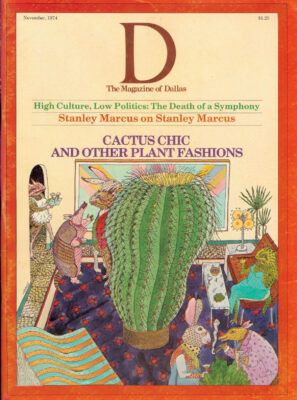Come early 1975,downtown will see its first new banking entrant in a decade, when the doors of United National Bank swing open at Main and Akard. And it’s no small wonder that while banks have been sprouting up in the suburbs like crabgrass, they’ve stayed out of downtown. Republic and First National have gradually increased their share of downtown deposits to 80 per cent, leaving nine other banks to fight over the scraps. And the progress of half of them has been blocked by turbulent management and ownership changes.
Enter United National Bank, organized by Ted Strauss, who will serve as United’s chairman. The bank’s game plan is to capture small and mid-sized commercial accounts, while not emphasizing ordinary customer accounts. (There are no plans for drive-in facilities.)
Presumably some of those accounts will come from First or Republic, where smaller commercial customers might not be receiving priority treatment, or where an account is looking for a second bank. The rest will have to be the bread and butter of any smaller downtown bank -promising small accounts that look like one day, with a little nurturing from the bank, will become big accounts.
Strauss’ charter application was approved in Washington last spring, but not until it had been turned down a year earlier. The strategy changes between the unsuccessful first application and the successful second try are interesting, to say the least.
The first move was to replace Carl Oates, a member of brother Bob Strauss’ law firm, as attorney representing the bank’s organizers. It’s no small wonder Oates’ replacement was Paul Eggers, a Dallas attorney and twice Republican gubernatorial candidate, who knows his way around Washington, specifically around the Treasury Department. After Eggers’ first gubernatorial loss in 1968, President Nixon rewarded Eggers’ efforts with appointment as general counsel to the Treasury Department, the department’s fourth highest office. National bank charters are ultimately approved by the Comptroller of the Currency, an office which falls under the Treasury Department.
The next change was to expand the number of organizers from seven to 12. Henry S. Miller Jr. joined’Strauss and Robert Coit as the largest investors at $150,000 each, while Pete Baldwin, Lonnie Pollock and UT-Austin business school Dean George Kozmetsky came in for $100,000 apiece. Along with Kozmetsky’s money came his know-how for producing solid economic reports (for the charter application) and entree to all that data stored at UT.
Next Strauss gathered a stack of well-wisher letters from every major downtown clothier, a handful from the downtown investment community, and most interesting, one from Bob Stewart, chairman of First International Bancshares, and another from James Berry, president of Republic of Texas.
United National’s opening will bring to 10 the number of downtown banks operating within a six-block area. Within 18 months, there may be an 11th.
The pending bank is Government Center State Bank, to be located across from the new courthouse at Jackson and Houston. The state bank board should hear the charter application sometime next spring or in early summer. Government Center’s chief organizer is Dallas attorney Roy Coffee Jr., a former aide to Gov. Briscoe.
Coffee’s bank hopes to concentrate on all those courthouse employees who draw regular paychecks, as well as those from other large firms in the west end of downtown.
Related Articles

Arts & Entertainment
VideoFest Lives Again Alongside Denton’s Thin Line Fest
Bart Weiss, VideoFest’s founder, has partnered with Thin Line Fest to host two screenings that keep the independent spirit of VideoFest alive.
By Austin Zook

Local News
Poll: Dallas Is Asking Voters for $1.25 Billion. How Do You Feel About It?
The city is asking voters to approve 10 bond propositions that will address a slate of 800 projects. We want to know what you think.

Basketball
Dallas Landing the Wings Is the Coup Eric Johnson’s Committee Needed
There was only one pro team that could realistically be lured to town. And after two years of (very) middling results, the Ad Hoc Committee on Professional Sports Recruitment and Retention delivered.


